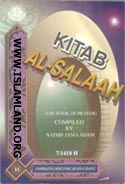Kitab Al-Salaah (The book of Prayer)

Salatul-Isstikhara
(Prayer To Seek Allah's Guidance)
It is natural that in his day-to-day affairs a Muslim is confronted
with important issues requiring decision making and which may force the
person to undergo much thinking, anxiety and even worry before the
person is able to decide affirmatively or negatively. It is with due
regard to such situations that the Prophet (peace be upon him)
accustomed for the Muslim Ummah a voluntary prayer to which a person
may resort to and through which he/she seeks from Allah (subhanahu wa
ta'ala) true guidance and the ability to reach the proper decision over
the particular matter.
This
prayer is known in Arabic as SALATUL-ISSTIKHARA and its importance is
such that the Prophet (peace be upon him) used to teach his companions
about it the same way he used to teach them the verses of the Holy
Qur'an. The companion Jabir (may Allah be pleased with him) said that
the Prophet (peace be upon him) used to exhort us to practice
Isstikhara for all our affairs.
The
manner of performing this prayer is that the person comes up with a
voluntary prayer of two rakaats (units) at anytime during the day or
night and upon completing the same the person recites a private
supplication in which he/she seeks the guidance of Allah (subhanahu wa
ta'ala). The supplication goes as follows: "ALLAHUMMA INNI ASTAKHYIRUKA
Bl'ILMIKA WA ASTAQDIRUKA BI QUDRATIKA WA AS-ALUKA MIN FADHLIKA-AL-AZIM,
FA INNAKA TAQDIRU WA TA'LAMU WALAA AQDDIRU WATA'ALAMU WALAA A'LAMU, WA
ANTA 'ALLAMUL-GHUYYUB. ALLAHUUMA IN KUNTA TA'LAMU ANNA HADHAL-AMRA.
(Here the person makes a mention of the matter for which guidance is
sought) KHEIRUN LEE FII DINII WAMA'AASHII WAAAQI-BATA AMRII FAQDURHU
LII, WA YASSIR-HU LII THUMMA BAARIK LII FIIHI, WAIN KUNTA TA' LAMU ANNA
HADHAL-AMRA (Also at this point the person makes a mention of the
matter for which guidance is sought) SHARRUN LEE FII DINII WA MA'AASHII
WA'AAQIBATA AMRII, FASRIFHU 'ANNII WASRIFNII 'ANHU WAQDUR LEE AL-KHEYRA
HEYTHU KANA THUMMA ARDHINII BIHII". Which means: "O Lord, I seek Your
guidance, through Your knowledge and power: and I ask You of Your great
bounties,- for You decree and I do not decree,- and You know and I know
not,- You are the knower of invisible. O Lord, if You know that this
matter (and here the person states the matter for which guidance is
sought) is of benefit to me in my religion, in my livelihood and in its
outcome, decide it for me. And make it easy for me and then bless it
for me, and if You know that this matter (and here he names it again)
is bad for me in my religion, in my livelihood, and in its outcome,
turn it from me and divert me from it and decree good for me wherever
it may be and make me pleased with it".
Having sought Allah's guidance as above, the person then resumes
his/her routine affairs and in the meantime awaiting the due response
from Allah (subhanahu wa ta'ala) which could appear to the person by
way of feelings in the person's heart of either confidence or
otherwise. Thus, where the person feels in his/her heart a sense of
vigor, optimism and satisfaction about the intended undertaking, then
the person may construe this as a positive response from Allah
(subhanahu wa ta'ala) and may accordingly proceed on with the intended
undertaking. Where, however, the opposite is true and the person's
doubts, and/or worries are not cleared, then the person may avoid the
intended undertaking for it could mean doom for him/her. Allah
(subhanahu wa ta'ala) says: “It is possible that ye dislike a
thing which is good for you, and that ye love a thing which is bad for
you. But Allah knoweth and ye know not” (Qur'an 2:216).
Indeed, the essence of this prayer is to test someone's trust in Allah
(subhanahu wa ta'ala), hence, the need to abide by the guidance of
Allah (subhanahu wa ta'ala) accordingly whether this may mean pursuing
or abandoning the intended undertaking. Allah (subhanahu wa ta'ala)
also says: “And if anyone puts his trust in Allah, sufficient is
Allah for him, for Allah surely accomplishes His purpose: Verily, for
all things has Allah appointed a due proportion” (Qur'an 65:3).
